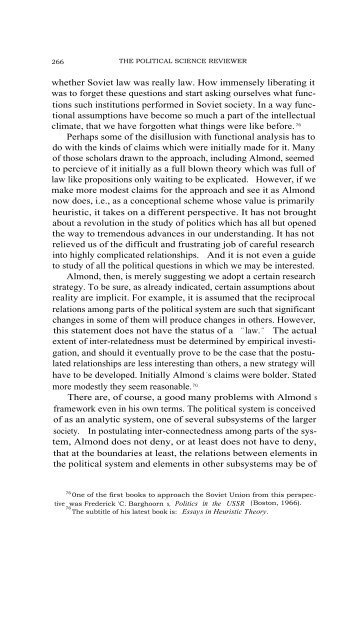FUNCTIONALISM AND ITS CRITICS - Intercollegiate Studies Institute
FUNCTIONALISM AND ITS CRITICS - Intercollegiate Studies Institute
FUNCTIONALISM AND ITS CRITICS - Intercollegiate Studies Institute
You also want an ePaper? Increase the reach of your titles
YUMPU automatically turns print PDFs into web optimized ePapers that Google loves.
266<br />
THE POLITICAL SCIENCE REVIEWER<br />
whether Soviet law was really law. How immensely liberating it<br />
was to forget these questions and start asking ourselves what functions<br />
such institutions performed in Soviet society. In a way functional<br />
assumptions have become so much a part of the intellectual<br />
climate, that we have forgotten what things were like before. 76<br />
Perhaps some of the disillusion with functional analysis has to<br />
do with the kinds of claims which were initially made for it. Many<br />
of those scholars drawn to the approach, including Almond, seemed<br />
to percieve of it initially as a full blown theory which was full of<br />
law like propositions only waiting to be explicated. However, if we<br />
make more modest claims for the approach and see it as Almond<br />
now does, i.e., as a conceptional scheme whose value is primarily<br />
heuristic, it takes on a different perspective. It has not brought<br />
about a revolution in the study of politics which has all but opened<br />
the way to tremendous advances in our understanding. It has not<br />
relieved us of the difficult and frustrating job of careful research<br />
into highly complicated relationships. And it is not even a guide<br />
to study of all the political questions in which we may be interested.<br />
Almond, then, is merely suggesting we adopt a certain research<br />
strategy. To be sure, as already indicated, certain assumptions about<br />
reality are implicit. For example, it is assumed that the reciprocal<br />
relations among parts of the political system are such that significant<br />
changes in some of them will produce changes in others. However,<br />
this statement does not have the status of a " law. " The actual<br />
extent of inter-relatedness must be determined by empirical investigation,<br />
and should it eventually prove to be the case that the postulated<br />
relationships are less interesting than others, a new strategy will<br />
have to be developed. Initially Almond ' s claims were bolder. Stated<br />
more modestly they seem reasonable. 7G<br />
There are, of course, a good many problems with Almond ' s<br />
framework even in his own terms. The political system is conceived<br />
of as an analytic system, one of several subsystems of the larger<br />
society. In postulating inter-connectedness among parts of the system,<br />
Almond does not deny, or at least does not have to deny,<br />
that at the boundaries at least, the relations between elements in<br />
the political system and elements in other subsystems may be of<br />
76 0ne of the first books to approach the Soviet Union from this perspec-<br />
tive was Frederick 'C. Barghoorn ' s, Politics in the USSR ( Boston, 1966).<br />
76<br />
The subtitle of his latest book is: Essays in Heuristic Theory.
















